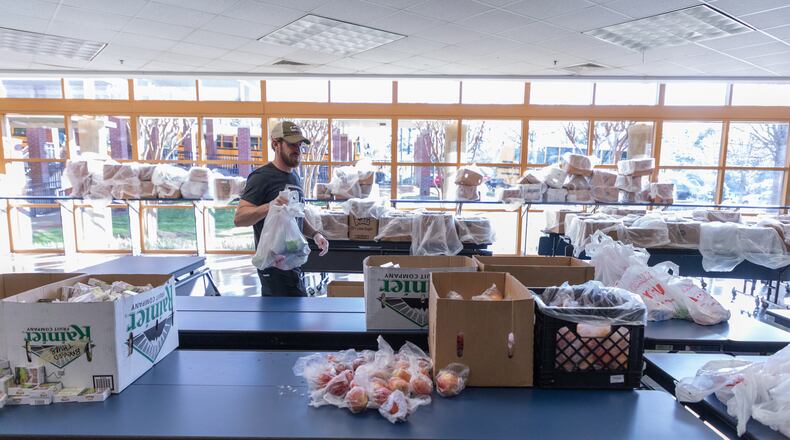Metro Atlanta school systems have distributed more than 1 million meals to area students since March 13, when many districts closed school their doors and shifted to online instruction in an attempt to stem the spread of the coronavirus.
School leaders said Thursday that they plan to continue distributing breakfast and lunch for the rest of the academic year after Gov. Brian Kemp on Wednesday ordered school buildings closed through summer.
Families have made the daily pilgrimages to school distribution sites where they pick up meals children would have ordinarily received in school cafeterias, including fruits, vegetables, peanut butter and jelly sandwiches and milk. And in cases where mobility was a challenge, districts loaded up school buses and brought the food directly to communities.
“Our intention is to provide meals for the duration of the closure as long as we can,” Marietta City Schools spokeswoman Jen Brock said. “If the governor or somebody comes out and says we have to cease doing it, obviously we’ll honor those orders. But as long as we’re allowed, that’s one of our No. 1 priorities during all of this and that’s not going to change.”
Experts say the support is critical for Georgians, both for children who would not get breakfast or lunch otherwise and for families seeking a sense of normalcy and routine during uncertain times.
“Some families look forward to picking up meals so that their children can see their classmates, teachers, and school employees from the car or at a distance,” said Taralyn Keese, a sociology lecturer at Clayton State University. “Meal pick up becomes an ‘outing’ they can look forward to.”
Molly Paulson, a registered dietitian and clinical instructor at Georgia State University, said food insecurity is a problem for many children across the region.
“A great number of these kids wouldn’t have meals at all,” she said.
For most school systems the biggest challenge is logistics.
Schools continue to get food deliveries from distributors, and have been forced to quickly put together pick up sites to keep perishables from spoiling. As word of the distributions grew, schools added more sites, sometimes tripling the number of distribution points.
“We were anticipating continuing through the end of April, but now we’ll have to reset for the rest of the school year,” Henry Schools spokesman JD Hardin said. “But we are going to keep it going.”
An Atlanta Public Schools’ spokesman said the district plans to continue distributing food in the months to come, but will have a more limited schedule. It will deliver food on Mondays only, but each bag will contain five breakfast and five lunch meals.
The Atlanta Community Food Bank, which has partnered with school systems in Atlanta, Marietta, DeKalb, Clayton and Fulton, said it may have to evaluate how much it can continue to help given the increased need.
“We are concerned about our supply of food given the rapidly growing levels of demand across the region,” Kyle Waide, president and CEO, said in an email. “We will monitor our capacity to serve very closely in the coming weeks and adjust our distribution patterns based on our capacity.
“We expect our food inventory will remain under pressure for the next few weeks until the larger food supply chain can return to a more balanced state of supply and demand than it has been the last few weeks,”Waide said.
Metro Atlanta schools have served more than 1 million meals to students and families since March 13.
Atlanta - 160,000
Clayton County — 52,000
Cobb County — 57,000
DeKalb County — 216,000
Fayette County — 22,000
Fulton County — 189,000
Gwinnett County — 294,000
Henry County — 34,000
Marietta - 40,000
Source: School districts
About the Author
Keep Reading
The Latest
Featured

